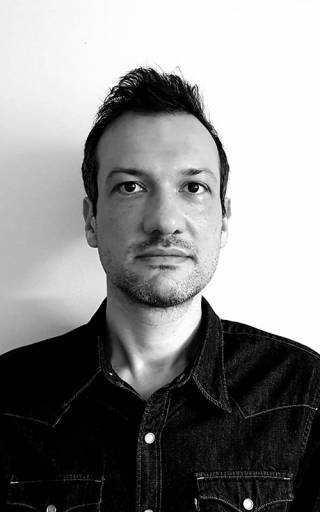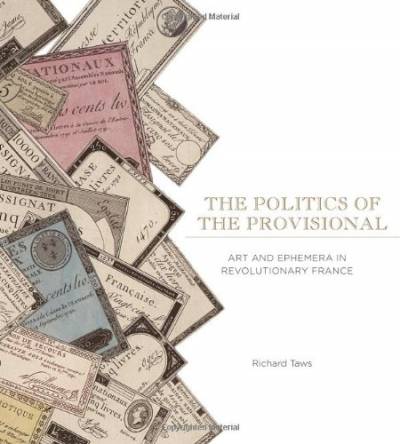Profile

Richard Taws specialises in European visual cultures of the eighteenth and nineteenth centuries. He taught previously at McGill University, Canada, and has been a Getty Postdoctoral Fellow, a Member of the School of Historical Studies at the Institute for Advanced Study, Princeton, and a Visiting Fellow at the Bard Graduate Center, New York. In 2012 he was awarded a Philip Leverhulme Prize, in 2018 a British Academy Mid-Career Fellowship, and in 2022 a Leverhulme Research Fellowship.
Richard is the author of The Politics of the Provisional: Art and Ephemera in Revolutionary France (Penn State University Press, 2013), and is co-editor of Time, Media, and Visuality in Post-Revolutionary France (with Iris Moon; Bloomsbury, 2021) and Art and Technology in Early Modern Europe (with Genevieve Warwick; Wiley-Blackwell, 2016). As a member of the ‘Multigraph Collective’, he co-authored Interacting with Print: Elements of Reading in the Era of Print Saturation (University of Chicago Press, 2018). Richard is currently completing a book about art and the optical telegraph in nineteenth-century France, to be published by MIT Press.
Contact Details
Office: 406, 21 Gordon Square
Office hours: Tuesdays, 9:30-10:30 and Thursdays, 12:00-13:00
Telephone: +44 (0)20 3108 4025 (internal 54025)
Email: r.taws@ucl.ac.uk
Appointment
Professor of History of Art and Visual Culture
Dept of History of Art
Faculty of S&HS
Research Themes
18th and 19th-Century French and British visual culture; art and the French Revolution; Atlantic revolutions; print culture; history and theory of media and technology
Research
Research Summary
Richard has written on varied topics, particularly in relation to the French Revolution and its aftermath. His research has focused on a wide range of everyday, ephemeral, or obsolete forms of visual and material culture; the social and political stakes of printed images; and histories and theories of science, media, and technology from the eighteenth century to the present. Much of his work examines the relation between images and concepts of historical time, and the entanglement of artistic and non-art objects, particularly in the fifty years either side of 1800.
Richard is currently completing Telegraphic Images in Nineteenth-Century France, which traces intersections between the period’s eclectic visual culture and new communication technologies—notably the optical telegraph system—in France and its colonies from the French Revolution onwards. A related article, on engraving machines, pencils, and other graphic devices developed in Egypt by Nicolas-Jacques Conté, was awarded the 2018 James L. Clifford Prize of the American Society for Eighteenth-Century Studies.
His first book, The Politics of the Provisional: Art and Ephemera in Revolutionary France (Penn State University Press, 2013), looked at images and objects made in France in the 1790s that represented conditions of transience, fragility, or incompletion. The Politics of the Provisional was shortlisted for the R. Gapper Prize of the Society for French Studies, and its publication was supported by the Andrew W. Mellon Foundation and by a Millard Meiss Publication Grant from the College Art Association. An article derived from this book, on paper money and post-revolutionary memory, won the 2011 Max Nänny Prize, awarded every three years by the International Association of Word and Image Studies, and has been included by Oxford Art Journal in a 40th anniversary collection of twelve key articles in the journal’s history.
Richard is editor, with Iris Moon, of Time, Media, and Visuality in Post-Revolutionary France (Bloomsbury, 2021), and with Genevieve Warwick, of Art and Technology in Early Modern Europe (Wiley-Blackwell, 2016), published first as a special issue of Art History. As a member of the ‘Multigraph Collective’, an interdisciplinary group of media scholars, he co-authored Interacting with Print: Elements of Reading in the Era of Print Saturation (University of Chicago Press, 2018). In 2016 he curated, with David Bindman, ‘Revolution Under a King: French Prints, 1789-1792’ and in 2020, with David Bindman and Colin Jones, ‘Witnessing Terror: French Revolutionary Prints, 1792-1794’, both at UCL Art Museum. Richard’s research has been published in journals including Grey Room, The Art Bulletin, Art History, Oxford Art Journal, RES: Anthropology and Aesthetics, Sculpture Journal, Annales historiques de la Révolution française, Perspective, Journal of Visual Culture, and Nonsite, as well as in books and catalogues. He has also written for Artforum, Apollo, Cabinet, and the London Review of Books, among other places.
Works in progress include A Companion to French Art, 1789 to the Present (Wiley-Blackwell), a collection of thirty new essays on French art and art history, edited with Natalie Adamson. Richard is also developing a new book on printmaker Charles Meryon’s work in relation to speculative colonial and property development schemes in the South Pacific and North America, and a project on imposters and doppelgängers in post-revolutionary exile communities. An essay derived from this research, on printed and photographic images of royal impostors, received the 2017 Nineteenth-Century Studies Association Article Prize.
Publications
Research Publications
Biography
Richard completed his PhD at UCL in 2005 and was an Assistant Professor in the Department of Art History and Communication Studies at McGill University, Canada, before returning to London in 2011. He was promoted to Reader in 2014 and Professor in 2022. Richard has been a Getty Postdoctoral Fellow, a Member of the School of Historical Studies at the Institute for Advanced Study, Princeton, and a Visiting Fellow at the Bard Graduate Center, New York. He was awarded a Philip Leverhulme Prize in 2012 and in 2018 a British Academy Mid-Career Fellowship. Richard is a member of the editorial board of Art History and a review editor for H-France Review. He is on leave in the academic year 2022-2023 as recipient of a Leverhulme Research Fellowship.
Teaching & Supervision
Richard teaches a variety of courses at both undergraduate and postgraduate levels. Recent MA special subject courses have included ‘Art and Technology in Nineteenth-Century France’, and ‘Time, Media, Revolution: Art and Politics in France, 1789-1871’.
He always welcomes enquiries from potential postgraduate students keen to research topics relating to eighteenth and nineteenth-century art and visual culture, politics, media, technology, and aesthetics, or that align in other ways with his research interests. Potential applicants should contact Richard directly to discuss their proposals.
Current PhD Supervision
Glynnis Stevenson, ‘The bleus and the blancs: Political Fractures and Fluidity at the 1889 Exposition Universelle’ (UCL, Primary Supervisor)
Domenico Pino, ‘Printmaking in the Kingdom of the Two Sicilies (1735–1799)’ (UCL, Primary Supervisor)
Marie Giraud, ‘Picturing the Religious Quarrels: Popular Religious Prints in Early Eighteenth-Century Paris’ (Queen Mary, University of London, Co-supervisor with Hannah Williams)
Nicholas Babbington, ‘Held to Account: British Caricature and Financial Discourse, c.1780-1800’ (UCL, Primary Supervisor)
Alexandra Ault, ‘Proof of the Proof: The Printsellers Association and the Fine Art Print Trade in Nineteenth-Century Britain’ (UCL, Primary Supervisor)
David Mitchell, ‘The Iconography of the Mask: Mimesis and Deception in Ancien-Régime France’ (McGill University, Co-supervisor with Angela Vanhaelen)
Completed PhD Students
Rosalind Hayes, ‘Look to Your Eating: Animals, Meat, and Visual Culture in Britain c.1880-1910’ (2022, UCL, Primary Supervisor)
Isabelle Masse, ‘Portrait du médium, médium du portrait: Les ‘spécificités historiques’ du pastel dans le long XVIIIe siècle,’ (2019, McGill University, Co-supervisor with Angela Vanhaelen. Now FQRSC Postdoctoral Fellow, UCLA)
Christina Smylitopoulos, ‘A Nabob’s Progress: Rowlandson and Combe’s The Grand Master, a Tale of British Imperial Excess, 1770-1830’ (2011, McGill University, Primary Supervisor. Now Associate Professor, University of Guelph)
Tania Solweig Shamy, ‘Frederick the Great’s Porcelain Diversion: The Chinese Tea-House at Sans-Souci’ (2009, McGill University, Co-supervisor with Bronwen Wilson)
 Close
Close


